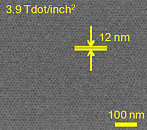- Joined
- Oct 9, 2007
- Messages
- 47,407 (7.52/day)
- Location
- Hyderabad, India
| System Name | RBMK-1000 |
|---|---|
| Processor | AMD Ryzen 7 5700G |
| Motherboard | ASUS ROG Strix B450-E Gaming |
| Cooling | DeepCool Gammax L240 V2 |
| Memory | 2x 8GB G.Skill Sniper X |
| Video Card(s) | Palit GeForce RTX 2080 SUPER GameRock |
| Storage | Western Digital Black NVMe 512GB |
| Display(s) | BenQ 1440p 60 Hz 27-inch |
| Case | Corsair Carbide 100R |
| Audio Device(s) | ASUS SupremeFX S1220A |
| Power Supply | Cooler Master MWE Gold 650W |
| Mouse | ASUS ROG Strix Impact |
| Keyboard | Gamdias Hermes E2 |
| Software | Windows 11 Pro |
A consortium led by Hitachi, including Japan's New Energy and Industrial Technology Development Organization (NEDO), a public-sector body that promotes research of energy-efficient technologies, National University Corporation Tokyo Institute of Technology, and Kyoto University, have developed a new hard drive data recording technology that promises to increase data density 8-fold.
The researchers have developed a new patterning technology for the magnetized bits that are laid on the platters, which are just 10 nm in size. This is made possible by using new materials, and making use of a self-arranged phenomenon of polymer materials. Its practical applications increases areal-density of disk platters to 3.9 Terabits per square inch, an 8-fold increase compared to the 500 Gigabits per square inch that's currently standard. This paves the way for 24 Terabyte (TB) hard drives in the very near future.

View at TechPowerUp Main Site
The researchers have developed a new patterning technology for the magnetized bits that are laid on the platters, which are just 10 nm in size. This is made possible by using new materials, and making use of a self-arranged phenomenon of polymer materials. Its practical applications increases areal-density of disk platters to 3.9 Terabits per square inch, an 8-fold increase compared to the 500 Gigabits per square inch that's currently standard. This paves the way for 24 Terabyte (TB) hard drives in the very near future.

View at TechPowerUp Main Site











 but i agree, i was so happy to see 100gb drives available back when i was using tens of gb and now I'm finding it easy to fill multiple tb, with future HD video that's well past 1080p hundreds of tb will become easy to fill.
but i agree, i was so happy to see 100gb drives available back when i was using tens of gb and now I'm finding it easy to fill multiple tb, with future HD video that's well past 1080p hundreds of tb will become easy to fill. .... even pc monitors havnt gone far past 1080p for a wile.
.... even pc monitors havnt gone far past 1080p for a wile. but it shows where we are heading and video at that kind of res will take up a crazy amount of storage space.
but it shows where we are heading and video at that kind of res will take up a crazy amount of storage space.